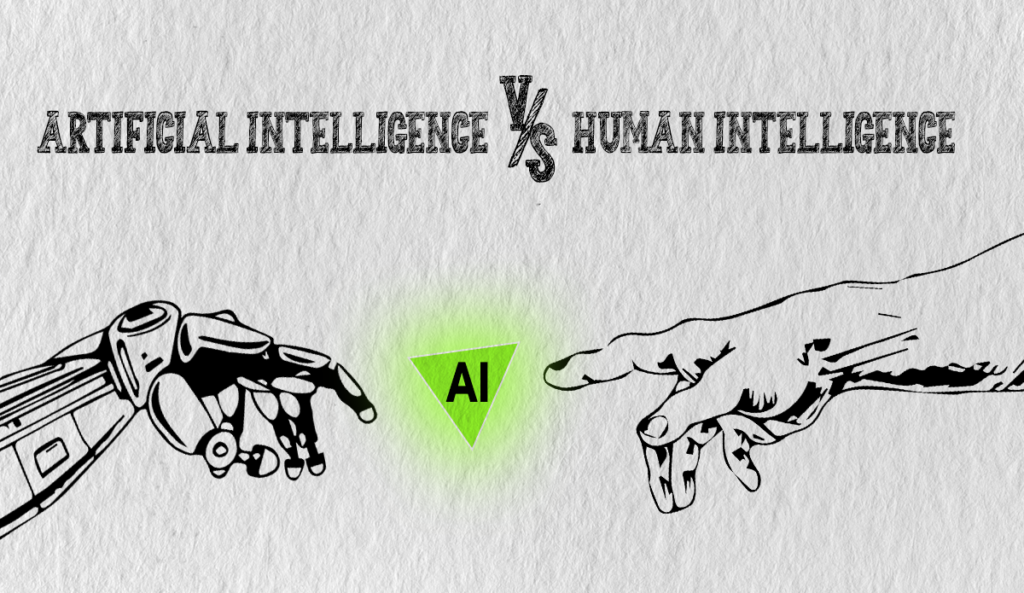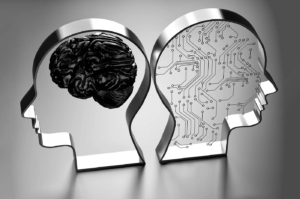
The Battle of Brains: Artificial Intelligence (AI) has been rapidly progressing over the last few years and has been changing the way we interact with technology.

Table of Contents
The Battle of Brains: Introduction
With advancements in machine learning, natural language processing, and robotics, AI has shown remarkable progress in various fields. The increasing capability of AI raises concerns about its impact on human jobs and the future of human intelligence.
In this article, we will discuss various points where we think that AI cannot work better than humans in certain areas, and how AI is taking over those areas quickly.
We will also explore how human intelligence can survive over AI and make our jobs secure.
Limitations of AI
There are various areas where AI was once thought to be incapable of surpassing human intelligence. These areas were believed to be the exclusive domain of human intelligence, but AI is making significant progress in these fields.
Creativity
One of the most significant areas where AI was believed to be incapable of performing was creativity. However, with the rise of generative AI, AI is now producing art, music, and even writing. AI-generated art is becoming increasingly popular, with some of it being sold for millions of dollars.
Empathy
Another area where humans excel is empathy. Humans are able to understand and share the feelings of others and provide emotional support. However, with the advancement of AI, it is now possible to create chatbots that are capable of detecting emotions and responding accordingly.
Decision making
Decision-making was believed to be an area where humans outperformed AI. However, AI is now capable of making complex decisions in various fields such as finance, medicine, and logistics. AI is making use of vast amounts of data to make predictions and identify patterns that humans may not be able to detect.
Taking over Areas where Humans are Weak
AI is not only excelling in areas where humans were once believed to be superior but is also taking over areas where humans are weak. These areas include:
Repetitive tasks
Humans are prone to making mistakes when performing repetitive tasks. AI, on the other hand, can perform repetitive tasks accurately and efficiently without getting tired or bored.
Dangerous tasks
Humans are at risk of injury or death when performing dangerous tasks such as mining, construction, or exploration. AI can be used to perform these tasks with minimal risk to human life.
Scalability
Humans have limitations when it comes to scalability. AI can be scaled up or down based on the requirements, making it more efficient and cost-effective.
Surviving in the Age of AI
While the advancements in AI are impressive, it is essential to consider the impact of AI on human jobs and the future of human intelligence. Here are some ways in which humans can survive in the age of AI:
Embrace Change
The rapid pace of technological change means that we need to be adaptable and willing to learn new skills. We need to embrace the changes brought about by AI and find ways to work alongside it.
Focus on Uniquely Human Skills
While AI may be better than humans in some areas, there are still many skills that are uniquely human, such as creativity, empathy, and critical thinking. We need to focus on developing these skills and find ways to complement AI.
Collaborate with AI
AI is not here to replace humans, but rather to work alongside them. We need to find ways to collaborate with AI to improve efficiency, productivity, and innovation.
Conclusion
AI is making significant progress in various fields and is changing the way we interact with technology. While there are concerns about the impact of AI on human jobs and the future of human intelligence, there are also opportunities to embrace change, focus on uniquely human skills, and collaborate with AI. As we move forward, it is essential to find a balance between the benefits of AI and the importance …of human intelligence in society.
FAQs
Q. Will AI completely replace humans in the workforce?
A. While AI is making progress in various fields, it is not here to replace humans. AI is designed to work alongside humans to improve efficiency, productivity, and innovation.
Q. What are the limitations of AI?
A. While AI has made significant progress in various fields, it still has limitations. AI lacks creativity, empathy, and critical thinking skills that are uniquely human. AI also requires large amounts of data to make decisions.
Q. Can AI replace human emotions?
A. AI can detect emotions and respond accordingly, but it cannot replace human emotions. Empathy and emotional support are essential in fields such as healthcare and counseling, which require a human touch.
Q. How can humans compete with AI?
A. Humans can compete with AI by focusing on uniquely human skills such as creativity, empathy, and critical thinking. Humans can also find ways to collaborate with AI to improve efficiency, productivity, and innovation.
Q. Is AI a threat to human intelligence?
A. AI is not a threat to human intelligence, but rather an opportunity to enhance it. AI can help humans perform tasks more efficiently, allowing humans to focus on developing skills that are uniquely human.
Final Words
AI has shown remarkable progress in various fields and is changing the way we interact with technology. While there are concerns about the impact of AI on human jobs and the future of human intelligence, there are also opportunities to embrace change, focus on uniquely human skills, and collaborate with AI. As we move forward, it is essential to find a balance between the benefits of AI and the importance of human intelligence in society.
(Disclaimer: GFI and GFI Team are updating knowledgeable content in this blog from official sources and are not aiming to promote any particular source or business through this and also, do not hold any copyrighting rights under our names for the content)





